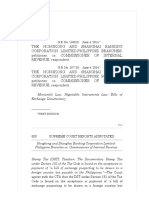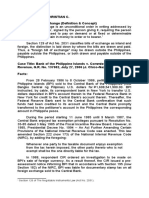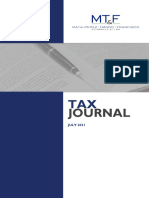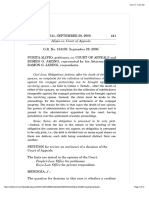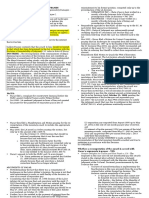002 - HSBC V CIR
002 - HSBC V CIR
Uploaded by
alexis_beaCopyright:
Available Formats
002 - HSBC V CIR
002 - HSBC V CIR
Uploaded by
alexis_beaOriginal Description:
Original Title
Copyright
Available Formats
Share this document
Did you find this document useful?
Is this content inappropriate?
Copyright:
Available Formats
002 - HSBC V CIR
002 - HSBC V CIR
Uploaded by
alexis_beaCopyright:
Available Formats
HSBC v.
CIR
June 4, 2014 | Leonardo-de Castro, J. | Bills of Exchange; DST
Digester: Fausto, Jaime Manuel A.
SUMMARY: HSBC performs custodial services on behalf of its
investor-clients. It received electronic messages from its foreign
clients, with instructions on the management of their local and
foreign accounts with HSBC in the Philippines.
DST is imposed on any bill of exchange or order for payment
purporting to be drawn in a foreign country but payable in the
Philippines.
HSBC paid DST for the electronic messages. Then CIR Rualo
issued a Ruling where he held that the electronic instructions do
not involve the transfer of funds from abroad and are thus not
subject to DST. The electronic messages were only instructions as
there can be no negotiable instrument to be made, signed or
issued in this case. CTA affirmed adding that electronic messages
lack the feature of negotiability, which is the ability to be
transferred. CA reversed ruling that the DST is imposed on the
acceptance or payment of the bill or order and DST should be
imposed because HSBC accepted their clients electronic orders to
pay. The SC reversed the CA ruling and affirmed the BIR Ruling
and CTA, reiterating their arguments in concluding that Sec. 181
of the Tax Code, which imposes the DST, does not contemplate the
electronic messages in this case.
DOCTRINE: Under the Tax Code, DST is imposed on any bill of
exchange or order for payment purporting to be drawn in a foreign
country but payable in the Philippines. Electronic message
instructions cannot be considered negotiable instruments [bills of
exchange] as they lack the feature of negotiability, which, is the
ability to be transferred.
Note: Ponente copy-pasted the BIR, CTA and CA rulings. I included
them all but in a summarized form, as they contain reiterations of
the relevant Nego doctrines.
FACTS:
HSBC performs custodial services on behalf of its investorclients, corporate and individual, resident or nonresident of the
Philippines, with respect to their passive investments in the
Philippines, particularly investments in shares of stocks in
domestic corporations. It serves as the collection agent with
respect to dividends and income from the investors passive
investments.
The investor-clients maintain Philippine peso and/or foreign
currency accounts, which are managed by HSBC through
instructions given through electronic messages known as
SWIFT,1 where they purchase shares of stock and then they
would send electronic messages from abroad instructing HSBC
to debit their accounts and to pay the purchase price upon
receipt of the securities.
Pursuant to the electronic messages of its investor clients,
HSBC purchased and paid Documentary Stamp Tax (DST) for
1997 and 1998.
Then CIR Rualo issued BIR Ruling 132-99, which basically
resolved the issue of WON these electronic instructions are
subject to DST, ruled that instructions from abroad on the
management of funds in the Philippines that do not involve
transfer of funds from abroad are not subject to DST. The
Ruling contained several doctrines (IMPORTANT!):
The electronic messages do not involve the actual
transaction of funds since the funds are already in
Philippine accounts, hence not subject to DST under Sec.
181 of the 1997 Tax Code;2
Note that Sec. 181 provides DST shall be imposed on any
bill of exchange or order for payment purporting to be
drawn in a foreign country but payable in the Philippines.
In HSBCs case, however, the payor abroad only made
instructions in the form of electronic messages regarding is
account in the Philippines. There is no negotiable
instrument to be made, signed or issued by the payee.
The electronic messages cannot be considered transactions
per se as there is no transfer of funds from abroad. The
instructions via the electronic messages could only be
considered as a memorandum, hence NO DST.
1 Society for Worldwide Interbank Financial Telecommunication.
2 SEC. 181. Stamp Tax Upon Acceptance of Bills of Exchange and Others.
Upon any acceptance or payment of any bill of exchange or order for the
payment of money purporting to be drawn in a foreign country but
payable in the Philippines, there shall be collected a documentary stamp
tax of Thirty centavos (P0.30) on each Two hundred pesos (P200), or
fractional part thereof, of the face value of any such bill of exchange, or
order, or Philippine equivalent of such value, if expressed in foreign
currency.
Under the Documentary Stamp Tax Law, the mere
withdrawal of money from a bank deposit, local or
foreign currency account, is not subject to DST, unless
the account so maintained is a current or checking account,
in which case, the issuance of the check or bank drafts is
subject to the documentary stamp tax imposed under
Section 179 of the 1997 Tax Code (NOTE: IF CASH AND
NOT BoE, NO DST!)
I this case, it is physically impossible for the payor to
prepare and sign an instrument to pay an obligation, so the
withdrawal and payment shall be made in cash, hence
no DST.
Based on this Ruling, HSBC filed an administrative claim for
refund representing the erroneously paid DST to the BIR for
1997 and 1998. BIR did not act.
CTA favored HSBC. It ordered CIR to refund or issue a tax
credit certificate in favor of HSBC (ALSO IMPORTANT!):
It ruled that the Sec. 180-181 of the Tax Code do not do not
contemplate electronic message instructions.
Payments and withdrawals in this case are not through
negotiable instruments but through cash, and it is
tantamount to an automatic bank transfer of local funds
from a savings to a checking account in one bank.
These electronic message instructions cannot be
considered negotiable instruments as they lack the
feature of negotiability, which, is the ability to be
transferred (Words and Phrases).
CA - reversed the CTA and ruled that the electronic messages
are subject to DST.
It held that HSBC admitted that the electronic messages
were orders to pay the purchases made by their clientinvestors. Hence, HSBCs acceptance of the electronic
messages required it to pay DST.
CA took the view that Sec. 181 of the Tax Code did not
impose the DST on the bill of exchange or order of
payment, but on the acceptance or payment of the bill
or order.
It based this on the nature of the tax. DST is levied on the
exercise by persons of certain privileges conferred by law
for the creation, revision, or termination of specific legal
relationships through the execution of specific instruments,
independently of the legal status of the transactions giving
rise thereto. It is an excise tax upon the privilege or facility
offered at exchanges for the transaction of a business.
The DST was exacted on HSBCs exercise of its privilege
under its draweedrawer relationship with its clientinvestor
through the execution of a specific instrument which, in the
case at bar, is the acceptance of the order for payment of
money.
RULING: Petition granted (in favor of HSBC). BIR ruling and CTA
affirmed. CA reversed.
Whether the electronic messages are considered bills of
exchange and are therefore subject to DST NO.
The DST under Section 181 of the Tax Code is levied on the
acceptance or payment of a bill of exchange purporting to be
drawn in a foreign country but payable in the Philippines.
A bill of exchange is an unconditional order in writing
addressed by one person to another, signed by the person
giving it, requiring the person to whom it is addressed to pay
on demand or at a fixed or determinable future time a sum
certain in money to order or to bearer.
The electronic messages of HSBCs investorclients containing
instructions to debit their respective local or foreign currency
accounts in the Philippines and pay a certain named recipient
also residing in the Philippines is not the transaction
contemplated under Section 181 of the Tax Code as such
instructions are parallel to an automatic bank transfer of local
funds from a savings to a checking account in the same bank.
Electronic messages are NOT bills of exchange. They mere
memoranda of the transaction and cannot be considered
negotiable instruments as they lack the feature of
negotiability, which is the ability to be transferred.
Electronic messages do not comply with Sec. 1, NIL:
They are not signed by the investor-clients as supposed
drawers of a BoE;
They do not contain an unconditional order to pay a sum
certain I money; and
They are not payable to order or bearer, but to a specifically
designated third party.
On Acceptance:
Sec 181 of the 1997 Tax Code [on the DST] contains the phrase
Upon any acceptance or payment of any bill of exchange or
order for the payment of money purporting to be drawn in a
foreign country but payable in the Philippines xxx, which was
unchanged from the past tax codes. The law imposes DST as
an excice tax on the privilege of either acceptance or
payment of a foreign bill of exchange or order for the
payment of money that was drawn abroad but payable in
the Philippines.
Under Section 173 of the 1997 Tax Code, the persons primarily
liable for the payment of the DST are those (1) making, (2)
signing, (3) issuing, (4) accepting, or (5) transferring the
taxable documents, instruments or papers.
Acceptance only applies to bills of exchange as found in Sec.
132, NIL. What is accepted is a bill of exchange, and the
acceptance of a bill of exchange is both the manifestation of
the drawees consent to the drawers order to pay money and
the expression of the drawees promise to pay.
Acceptance is made upon the presentment of the bill of
exchange, or within 24 hours after such presentment.
Presentment for acceptance is the production or exhibition of
the bill of exchange to the drawee for the purpose of obtaining
his acceptance. Presentment for payment is the presentation of
the instrument to the person primarily liable for the purpose of
demanding and obtaining payment thereof.
Thus, whether it be presentment for acceptance or
presentment for payment, the negotiable instrument has to be
produced and shown to the drawee for acceptance or to the
acceptor for payment.
DST applies only after acceptance or payment done after
presentment for acceptance or presentment for payment,
respectively.
As applied, the electronic messages do not qualify as
presentment of acceptance or payment, thus no DST. This
further bolsters the argument that there was no bill of
exchange in this case.
In conclusion, HSBC could not have been held liable for DST
under Section 230 of the 1977 Tax Code, as amended, and
Section 181 of the 1997 Tax Code as it is not a person making,
signing, issuing, accepting, or, transferring the taxable
instruments under the said provision.
You might also like
- 8 Leadership StylesDocument10 pages8 Leadership StylesJimbert Hora TingcangNo ratings yet
- HSBC Vs CIRDocument1 pageHSBC Vs CIRJoan PabloNo ratings yet
- HSBC v. CIRDocument2 pagesHSBC v. CIRNikkiZai86% (7)
- HSBC V CirDocument30 pagesHSBC V CirHeidiNo ratings yet
- Regulatory Guide to Money Transmission & Payment Laws in the U.S.From EverandRegulatory Guide to Money Transmission & Payment Laws in the U.S.No ratings yet
- 089 - LBC Express v. CADocument3 pages089 - LBC Express v. CAalexis_beaNo ratings yet
- 3 Dish-TvDocument73 pages3 Dish-TvDevendra Patani100% (1)
- HSBC vs. CIR, G.R. No. 166018, June 04, 2014Document2 pagesHSBC vs. CIR, G.R. No. 166018, June 04, 2014GeorginaNo ratings yet
- 4.HSBC VsDocument3 pages4.HSBC VsMatt EvansNo ratings yet
- Digest HSBC Vs CirDocument2 pagesDigest HSBC Vs CirJoan Atup100% (1)
- HSBC vs. Cir G.R. No. 166018, June 04, 2014 Facts:: Electronic InstructionsDocument3 pagesHSBC vs. Cir G.R. No. 166018, June 04, 2014 Facts:: Electronic InstructionsKaren Ryl Lozada BritoNo ratings yet
- HSBC Vs CIRDocument3 pagesHSBC Vs CIRMary Joyce Lacambra AquinoNo ratings yet
- Case DigestDocument4 pagesCase DigestJohn Robert BautistaNo ratings yet
- 7 HSBC VS CIR Nego DIGESTDocument2 pages7 HSBC VS CIR Nego DIGESTajdgafjsdgaNo ratings yet
- HSBC vs. CIRDocument10 pagesHSBC vs. CIRArvy VelasquezNo ratings yet
- Cruz Suzanne P. Case Digest No. 5 HSBC Vs CirDocument1 pageCruz Suzanne P. Case Digest No. 5 HSBC Vs CirSuzanne Pagaduan CruzNo ratings yet
- Case Digest 2Document6 pagesCase Digest 2Christina AureNo ratings yet
- HSBC v. CIRDocument2 pagesHSBC v. CIRReymart-Vin MagulianoNo ratings yet
- Nego SalaoDocument23 pagesNego SalaoJohn Robert BautistaNo ratings yet
- Nego Case Digests 01Document44 pagesNego Case Digests 01KHRISTINE JOAN TABUNANNo ratings yet
- HSBC V CIRDocument16 pagesHSBC V CIRMp CasNo ratings yet
- HKSBC V CIRDocument4 pagesHKSBC V CIRiptrinidadNo ratings yet
- The Hongkong and Shanghai Banking Corporation Limited - Philippine Branches vs. Commissioner of Internal Revenue, GR Nos. 166018 and 167728, June 24, 2014Document2 pagesThe Hongkong and Shanghai Banking Corporation Limited - Philippine Branches vs. Commissioner of Internal Revenue, GR Nos. 166018 and 167728, June 24, 2014Juan Dela CruzNo ratings yet
- Nego Cases 01Document11 pagesNego Cases 01Jon Mayette SalacupNo ratings yet
- Part 1 DigestDocument121 pagesPart 1 DigestGem BorreoNo ratings yet
- HSBC Vs CIRDocument1 pageHSBC Vs CIRAbrahamNo ratings yet
- Nil, Case Digest - 18 OctDocument133 pagesNil, Case Digest - 18 OctMarrion Ferrer0% (1)
- 15 - HSBC V. CIR - EscraDocument9 pages15 - HSBC V. CIR - EscraElmer Dela CruzNo ratings yet
- 1 HK Vs CIRDocument22 pages1 HK Vs CIRAngelo AcacioNo ratings yet
- 1st Set Full Text Plus CDE of OutlineDocument129 pages1st Set Full Text Plus CDE of Outlinednel13No ratings yet
- Nego Module 2Document7 pagesNego Module 2randomvdlmxNo ratings yet
- Test Doc 3Document14 pagesTest Doc 3ChaNo ratings yet
- 68 BPI vs. CIR (GR No. 137002, July 27, 2006)Document22 pages68 BPI vs. CIR (GR No. 137002, July 27, 2006)Alfred GarciaNo ratings yet
- Philacor Credit Corporation V CIRDocument6 pagesPhilacor Credit Corporation V CIRBettina Rayos del SolNo ratings yet
- Hong Kong and Shanghai Banking Corporation Limited vs. CIRDocument3 pagesHong Kong and Shanghai Banking Corporation Limited vs. CIRJayrell CastorNo ratings yet
- 40 BPI V CIRDocument4 pages40 BPI V CIRCarlo FernandezNo ratings yet
- Republic of The Philippines Court Tax Appeals CityDocument13 pagesRepublic of The Philippines Court Tax Appeals CityPrintet08No ratings yet
- Harvey UpworkDocument63 pagesHarvey UpworkEdmund Earl TimothyNo ratings yet
- THE HONGKONG & SHANGHAI BANKING CORPORATION LIMITED - PHILIPPINE BRANCHES vs. COMMISSIONER OF INTERNAL REVENUEDocument2 pagesTHE HONGKONG & SHANGHAI BANKING CORPORATION LIMITED - PHILIPPINE BRANCHES vs. COMMISSIONER OF INTERNAL REVENUETrudgeOnNo ratings yet
- Benitez, Allan Christian C. Doctrine: Bill of Exchange (Definition & Concept)Document5 pagesBenitez, Allan Christian C. Doctrine: Bill of Exchange (Definition & Concept)Arrianne ObiasNo ratings yet
- CIR v. BPI, G.R. No. 147375, 2006Document2 pagesCIR v. BPI, G.R. No. 147375, 2006BREL GOSIMATNo ratings yet
- Philacor Credit Corporation vs. CIRDocument3 pagesPhilacor Credit Corporation vs. CIRCaroline A. Legaspino50% (2)
- Philippine Banking Corporation vs. Commissioner of Internal Revenue (January 30, 2009)Document3 pagesPhilippine Banking Corporation vs. Commissioner of Internal Revenue (January 30, 2009)ric tanNo ratings yet
- BPI Vs CIRDocument2 pagesBPI Vs CIRPaolo DoydoraNo ratings yet
- Cta 00 CV 06505 D 2003oct13 AssDocument11 pagesCta 00 CV 06505 D 2003oct13 AssPrintet08No ratings yet
- TAX - Documentary Stamp Tax CasesDocument9 pagesTAX - Documentary Stamp Tax CasesMarife Tubilag ManejaNo ratings yet
- RMO No. 43-2020Document4 pagesRMO No. 43-2020Miming BudoyNo ratings yet
- Prudential Bank v. CIR (2011)Document3 pagesPrudential Bank v. CIR (2011)Alexia CastilloNo ratings yet
- DigestDocument12 pagesDigestAnna Marie DayanghirangNo ratings yet
- Int'l Exchange Bank Vs CIRDocument2 pagesInt'l Exchange Bank Vs CIRMikhaela Maria VaronaNo ratings yet
- RMC No. 20-2022Document3 pagesRMC No. 20-2022Jey VlackNo ratings yet
- 3 - Bpi Vs CirDocument1 page3 - Bpi Vs CirClaribelle Dianne Rosales ManriqueNo ratings yet
- Vod 352850 5756Document28 pagesVod 352850 5756Nukamreddy Venkateswara ReddyNo ratings yet
- Manual AML Training Form-Version 1.4Document6 pagesManual AML Training Form-Version 1.4tushar6768No ratings yet
- Case Digest NilDocument10 pagesCase Digest NilMarc AcostaNo ratings yet
- Pdic (Deposit Insurance)Document3 pagesPdic (Deposit Insurance)Allia AntalanNo ratings yet
- Republic of The Philippines Court of Tax Appeals Quezon CityDocument11 pagesRepublic of The Philippines Court of Tax Appeals Quezon CityCJNo ratings yet
- MTF Tax Journal July 2021Document27 pagesMTF Tax Journal July 2021Earle EdraNo ratings yet
- Digested Philacor Vs Cir (Taxation)Document1 pageDigested Philacor Vs Cir (Taxation)kookissncream100% (1)
- What You Need To Know For Your Virtual Currency Exchange Registration in The Philippines?Document5 pagesWhat You Need To Know For Your Virtual Currency Exchange Registration in The Philippines?MHILET BasanNo ratings yet
- BIR Form 1707Document3 pagesBIR Form 1707catherine joy sangilNo ratings yet
- Negotiable Instruments Case Digests PDFDocument94 pagesNegotiable Instruments Case Digests PDFAllan Lloyd MendozaNo ratings yet
- Crypto Taxation in USA: A Comprehensive Guide to Navigating Digital Assets and TaxationFrom EverandCrypto Taxation in USA: A Comprehensive Guide to Navigating Digital Assets and TaxationNo ratings yet
- Bernas v. CincoDocument28 pagesBernas v. Cincoalexis_beaNo ratings yet
- Duran v. DuranDocument5 pagesDuran v. Duranalexis_beaNo ratings yet
- Uriarte v. Cfi of NegrosDocument9 pagesUriarte v. Cfi of Negrosalexis_beaNo ratings yet
- 043 - Tecson v. ComelecDocument5 pages043 - Tecson v. Comelecalexis_beaNo ratings yet
- Sps. Domingo v. RocesDocument12 pagesSps. Domingo v. Rocesalexis_beaNo ratings yet
- 164 - Terelay v. YuloDocument3 pages164 - Terelay v. Yuloalexis_beaNo ratings yet
- 292 - Zarate v. CADocument3 pages292 - Zarate v. CAalexis_bea100% (1)
- AM-02-11-12 Rule On Provisional Orders Section 1. When Issued, - Upon ReceiptDocument3 pagesAM-02-11-12 Rule On Provisional Orders Section 1. When Issued, - Upon Receiptalexis_beaNo ratings yet
- Gallanosa v. ArcangelDocument14 pagesGallanosa v. Arcangelalexis_beaNo ratings yet
- Gallanosa v. ArcangelDocument14 pagesGallanosa v. Arcangelalexis_beaNo ratings yet
- Alipio v. CaDocument12 pagesAlipio v. Caalexis_beaNo ratings yet
- GR 189185 2016 PDFDocument47 pagesGR 189185 2016 PDFalexis_beaNo ratings yet
- 134 - Fores v. MirandaDocument4 pages134 - Fores v. Mirandaalexis_beaNo ratings yet
- Duran v. DuranDocument5 pagesDuran v. Duranalexis_beaNo ratings yet
- Alaban v. CaDocument15 pagesAlaban v. Caalexis_beaNo ratings yet
- Binay v. DomingoDocument11 pagesBinay v. Domingoalexis_beaNo ratings yet
- Cuenco v. CaDocument26 pagesCuenco v. Caalexis_beaNo ratings yet
- Alaban v. CaDocument15 pagesAlaban v. Caalexis_beaNo ratings yet
- December 10, 1990 - Paras, C.J.Document2 pagesDecember 10, 1990 - Paras, C.J.alexis_beaNo ratings yet
- Dario Nacar V. Gallery Frames: P471 320. Case Was Again Forwarded To The Computation andDocument3 pagesDario Nacar V. Gallery Frames: P471 320. Case Was Again Forwarded To The Computation andalexis_beaNo ratings yet
- 024.5 - Francisco v. Toll Regulatory BoardDocument4 pages024.5 - Francisco v. Toll Regulatory Boardalexis_beaNo ratings yet
- BHUSA2017Document68 pagesBHUSA2017hamabow241No ratings yet
- DE2 115 User Manual1Document116 pagesDE2 115 User Manual1Ali AlrifaiNo ratings yet
- UPSC-COMMERCE - PYQ-Part-2-2015-2022Document39 pagesUPSC-COMMERCE - PYQ-Part-2-2015-2022Ankit JaiswalNo ratings yet
- Electro Mechanical ProjectsDocument11 pagesElectro Mechanical ProjectssameershirgaonkarNo ratings yet
- Mile1 Case StudyDocument7 pagesMile1 Case StudyHari ShankarNo ratings yet
- LCD TV Service Manual: Konka Group Co, LTDDocument20 pagesLCD TV Service Manual: Konka Group Co, LTDcristhianNo ratings yet
- Cryotherapy AftercareDocument1 pageCryotherapy AftercareLi NguyenNo ratings yet
- Chapter 15Document5 pagesChapter 15Marvin Strong100% (2)
- Dillimax 690 T: Plates With High Elastic LimitDocument2 pagesDillimax 690 T: Plates With High Elastic LimitAnonymous AlhzFE9EVNNo ratings yet
- Eni I-Sigma CIDocument16 pagesEni I-Sigma CIsami1243No ratings yet
- ITP ErectionDocument3 pagesITP Erectionjanpaul2481No ratings yet
- Control Ad orDocument36 pagesControl Ad orAle GonzalezNo ratings yet
- SAN Sizing GuideDocument4 pagesSAN Sizing GuideConstantin VidenskiNo ratings yet
- Ravikumar Vijayan: Huma ResourcesDocument3 pagesRavikumar Vijayan: Huma Resourcesmadhusudanan.asbNo ratings yet
- Sec 701 Study Guide SampleDocument25 pagesSec 701 Study Guide SampleFOLAYEMI OLUWASEGUNNo ratings yet
- Acer Aspire E1-510 - Compal La-A621p (Z5we3. Z5WT3)Document38 pagesAcer Aspire E1-510 - Compal La-A621p (Z5we3. Z5WT3)Ivanée CarelliNo ratings yet
- Ir7105 Series PCDocument292 pagesIr7105 Series PCJulio CésarNo ratings yet
- BUS 800 Final AssignmentDocument11 pagesBUS 800 Final AssignmentAlex MorganNo ratings yet
- People Versus PangilinanDocument3 pagesPeople Versus PangilinanSherwin Anoba CabutijaNo ratings yet
- 1.4 Lecture Notes-4 (DR)Document5 pages1.4 Lecture Notes-4 (DR)Anil Kumar SinghNo ratings yet
- Profitability & Liquidity Ratio AnalysisDocument19 pagesProfitability & Liquidity Ratio AnalysisananditaNo ratings yet
- 19MEE215 Lecture 5 & 6 - Force Relationship in Metal CuttingDocument17 pages19MEE215 Lecture 5 & 6 - Force Relationship in Metal Cuttingprakash marimuthuNo ratings yet
- Abstract of G-HovenDocument6 pagesAbstract of G-HovenmartinezreamieNo ratings yet
- WIP Sample Resume FresherDocument1 pageWIP Sample Resume FresherPranav TripathiNo ratings yet
- Journey Of: MR Pranab Mukherjee (President of India)Document18 pagesJourney Of: MR Pranab Mukherjee (President of India)Atul PandeyNo ratings yet
- MMS - Compliance Annexure - 1,2,3Document5 pagesMMS - Compliance Annexure - 1,2,3SatNo ratings yet
- Oracle AGIS - IntercompanyDocument8 pagesOracle AGIS - IntercompanyAmitNo ratings yet
- 31 Days To Survival - A Complete Plan For Emergency Preparedness - M.D. Creekmore - Paladin Press - 2012Document157 pages31 Days To Survival - A Complete Plan For Emergency Preparedness - M.D. Creekmore - Paladin Press - 2012Milojka MaksimovicNo ratings yet



